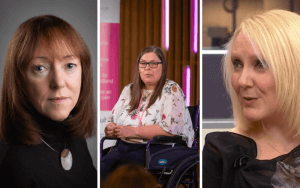A new report and an event set to take place at next month’s COP 26 summit in Glasgow could provide a “catalyst” for raising awareness of the disproportionate impact of climate change on disabled people, say campaigners.
The Scottish disabled people’s organisation (DPO) Inclusion Scotland has helped to secure an event focused on disabled people and climate change for the first time in the 30-year history of the UN climate change treaty.
Inclusion Scotland will use the “side-event” on 5 November to present its new report on climate change, disabled people and climate action in Scotland.
It has been working with allies including McGill University in Canada and International Disability Alliance (IDA) to ensure disabled people have a platform at COP 26.
The Inclusion Scotland report makes it clear that disabled Scots stand to be harder hit by climate change than non-disabled people but are often excluded or disadvantaged by actions taken to address it.
The report says that disabled people have been “perhaps the most overlooked group” in negotiations, policy-making and implementing policy on climate change.
It points out that ground floor and level access properties, required by many disabled people with mobility impairments, are particularly vulnerable to flooding, while many nursing and residential homes have been built on flood plains.
And, as the COVID-19 pandemic has shown, disabled people are often among those worst-affected in an emergency, and least able to access emergency support.
The report, It’s Our Planet Too…, written by Inclusion Scotland’s policy manager, Susie Fitton, says that disabled people’s “rights, needs and perspectives have been systematically neglected in international, national and local responses to a changing climate”.
It highlights how efforts to reduce emissions in Scotland can “actively discriminate” against disabled people, through acts of “eco-ableism”.
Such acts have already included banning plastic straws without realising that some disabled people need them to drink; removing accessible parking bays to make way for cycle lanes; and setting up low-emission zones and promoting electric vehicles when disabled people rely on cars or cannot afford to buy new electric vehicles.
The report warns that planning for low-carbon cities that favour pedestrianisation “may result in urban ‘no go’ zones for disabled people reliant on cars, and taxis, when public transport is not accessible or suitable for them”.
It adds: “There is very little research evidence on the impact of zero carbon policymaking on disabled people, in Scotland, or anywhere else for that matter.”
It makes several calls for action from the UN, the UK and Scottish governments, local authorities and voluntary organisations and climate activists.
It stresses the need for governments to include disabled people in policy-making around climate change, for activists to engage with disabled people to make their protests accessible, and for the UN to recognise DPOs and allies as a key, separate grouping in negotiations.
Moira Tasker, Inclusion Scotland’s chief executive, said: “The harms caused by climate change are very real for disabled Scots.
“Extreme weather, floods and heatwaves can be catastrophic for some disabled people.
“These are the people in our society who are already more likely to be marginalised by poverty, less likely to be evacuated safely, more prone to health risks and struggle to get insurance that protects their homes.
“Despite a growing recognition that disabled Scots may be harder hit by climate impacts, current efforts to reduce local emissions, tackle waste and reduce plastic pollution and plan for future emergencies can exclude and discriminate against disabled people.
“This needs to change, and we hope this event, and our report, will be the catalyst for that change.”
Elham Youssefian, IDA’s inclusive humanitarian action and disaster risk reduction adviser, said it was an “historic moment for the disability movement”.
He said: “It is time for global leaders and climate action decision-makers to recognise that as 15 per cent of the world’s population, disabled people experience the most harm caused by climate change.
“For this reason, no climate action decision should be considered legitimate or efficient unless it is compliant with the rights of disabled people and in consultation with their representative organisations.”
Professor Sébastien Jodoin, from the Disability-Inclusive Climate Action Research Program at McGill University, which is leading on the event, added: “Disabled people are on the frontlines of the climate crisis – they are adversely affected both by the impacts of climate change and careless and ableist policies adopted to reduce carbon emissions.
“All over the world, an increasing number of disabled people are speaking out on the climate crisis and demanding ambitious and inclusive climate action from their governments.
“This report from Inclusion Scotland and this ground-breaking side-event is exactly the sort of advocacy that is needed to raise awareness of the disproportionate impacts of climate change for disabled people and to promote disability-inclusive climate action at every level.”
A note from the editor:
Please consider making a voluntary financial contribution to support the work of DNS and allow it to continue producing independent, carefully-researched news stories that focus on the lives and rights of disabled people and their user-led organisations.
Please do not contribute if you cannot afford to do so, and please note that DNS is not a charity. It is run and owned by disabled journalist John Pring and has been from its launch in April 2009.
Thank you for anything you can do to support the work of DNS…

 New research exposes ‘shocking and eye-opening’ levels of bullying of universal credit claimants
New research exposes ‘shocking and eye-opening’ levels of bullying of universal credit claimants Government must reverse Tory policy on adapting to climate change, say disabled activists after court defeat
Government must reverse Tory policy on adapting to climate change, say disabled activists after court defeat ‘Our members are raging’: Shock and anger as Scottish government’s ‘sham’ co-production leads to ‘weak’ disability plan
‘Our members are raging’: Shock and anger as Scottish government’s ‘sham’ co-production leads to ‘weak’ disability plan